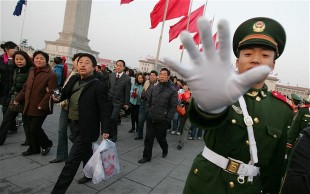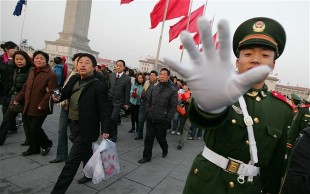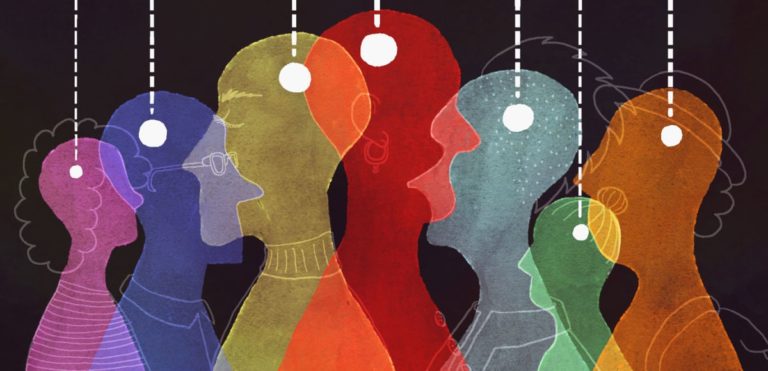Just before Prime Minister Stephen Harper’s recent visit to China, several Aboriginal politicians sent a “letter” to Chinese President Hu Jintao to complain about Canada’s treatment of Aboriginals.
Native politicians from five reserve governments in British Columbia, known as the Yinka Dene Alliance, complained about how Aboriginals are statistically over-represented in prisons, BC treaty negotiations, the proposed Northern Gateway pipeline and Saskatchewan police among other grievances.
If the idea of a “human rights” letter sent to China’s president sounds a tad too cute, that’s because it is.
The Globe and Mail interviewed several signatories and one openly admitted the game in play. Chief Larry Nooski argued this was “tit for tat.” The letter just brought up “the facts of life as we see it as First Nations,” said Nooski.
Fair enough. So let us consider the facts of Canada’s recent treatment of Aboriginal Canadians, and compare to China’s treatment of its own citizens.
In 1960, just as Prime Minister John Diefenbaker restored the vote to status Indians (a long overdue restoration of their civil rights), China’s dictator, Mao Tse-Tung, had already imposed the “Great Leap Forward” on his citizens. It was a repressive ideological attack on the Chinese people that included gulags, to which 10 per cent of the country’s intellectuals, technicians and engineers were eventually sent.
Another feature was collectivized land which produced a devastating famine. French author Jean-Louis Margolin, writing in 1999, described it as the greatest man-made famine in history with estimates of the death toll at “somewhere between 20 million and 43 million people.”
In Canada, in the late 1960s and early 1970s, Pierre Trudeau argued for classic liberal freedoms for status Indians, for rights and responsibilities based on everyone’s shared humanity. But too many native leaders rejected that in favour of so-called “group rights” that ultimately harm the individual, including and especially individual Aboriginals on reserve.
Meanwhile, in China, the Chairman was at it again with another ideological terror, the Cultural Revolution, which ran from 1966 until 1976. One could be an enemy of the state for practicing “foreign” activities such as drinking coffee or wearing high heels. Between 12 million and 20 million people considered too urban or too intellectual were forcibly relocated to the countryside for re-education.
More recently, despite the economic reforms introduced in China after 1979, social and political freedoms are still heavily restricted. The Chinese cannot surf the internet freely or change the party in power. In the background are the limits on dissent, made clear by the government’s 1989 Tiananmen Square massacre.
Back to Canada. The Yinka Dene Alliance’s Nooski claimed he wanted Hu to know “that First Nations are not being treated fairly in Canada in terms of their aboriginal rights.”
If Nooski were describing Canada around Confederation, he would have a solid point. Canadian society and government policy were shot through with racism. But as applied to recent history, such rhetoric is nonsense on stilts.
To use two examples, on-reserve treaty Indians are not subject to many of the taxes that other Canadians must pay. In most cases, this results not from treaty or constitutional rights but federal legislation (the Indian Act). Post-secondary tuition is also often free. The fairness argument is more properly applied to non-reserve taxpayers, Native and non-native alike, subject to a raft of taxes and who must pay for their own degrees.
Many of the problems Aboriginals face in Canada today are directly attributable to a reserve system that defies economic logic and too many reserve chiefs who defend it.
Example A: In 2002, accountability legislation proposed by Indian Affairs Minister Robert Nault (and which would have granted greater power to reserve residents vis-à-vis chiefs) was opposed by many native chiefs. Because of that, Paul Martin killed the bill when he became prime minister in 2003.
Example B: When more recently, the Conservative government during its minority phase pushed for matrimonial property rights for women on reserves, the proposed change was fought by plenty of male First Nations chiefs. It had to await the majority Conservative government.
Even the much-noted statistic as regards Aboriginals in prison misses this salient point: much Aboriginal crime is committed against other Aboriginals. What are the courts to do? Tell a native female that her Aboriginal male attacker deserves leniency because some other native male is already in jail and thus the statistics must be evened out a bit?
The “appeal” to a still-repressive Chinese regime and on errant facts is an embarrassment not to Canada but to the chiefs who signed the letter.
Thankfully, in contrast to the Yinka Dene Alliance’s weird appeal to a Chinese autocrat, there are plenty of progressive Aboriginal leaders – Calvin Helin, Manny Jules and selected First Nations reserve chiefs—who push for real and positive change.
-Mark Milke is the editorial board chair of C2C Journal www.c2cjournal.ca where this first appeared.








